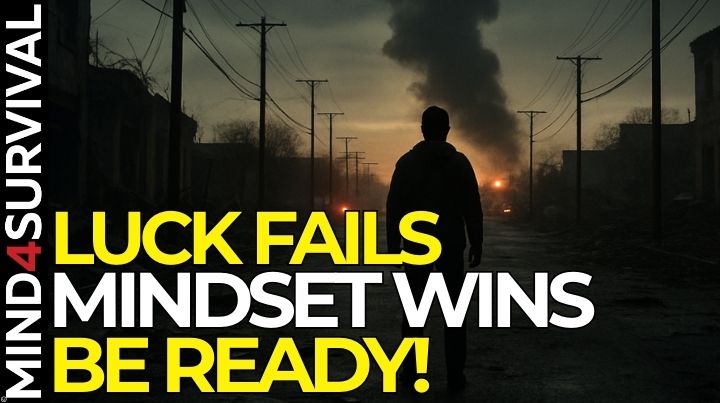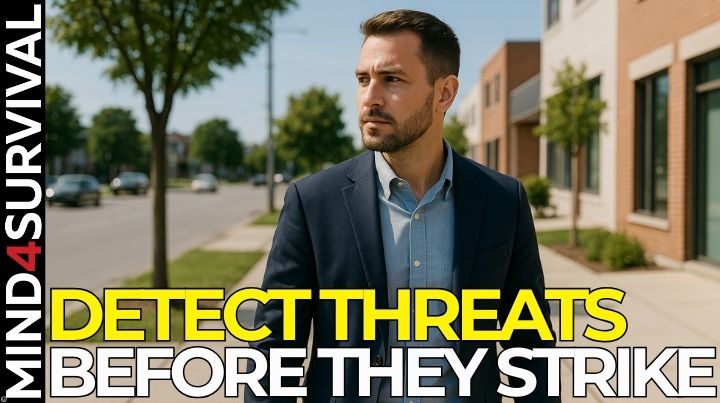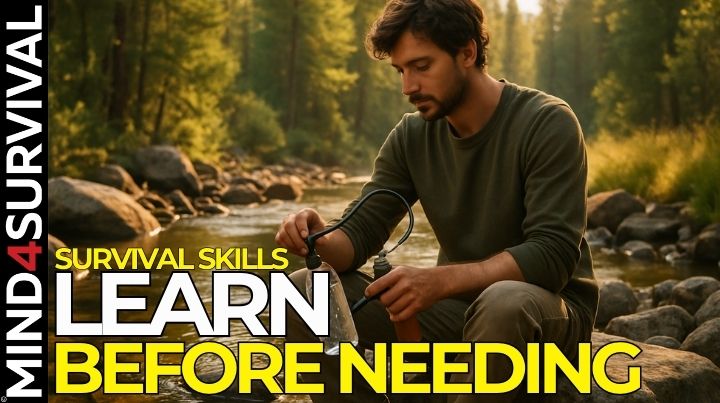67: Are Preppers Crazy? How to Overcome the Stereotype


Podcast: Play in new window | Download
What often stops people from taking preparedness seriously is the question, “Are preppers crazy?” It's that very question that also drives people within the preparedness community nuts.
After all, especially with 2020 in the review mirror, does preparing for challenging times and unforeseen difficulties sound crazy?
Unfortunately, when it comes to answering the question of “Are preppers crazy?,” the readiness community often suffers from a label that it has, at least in part, fostered for itself.
Therefore, if the preparedness community wants to be taken seriously and not be looked upon as crazy preppers, it first needs to accept responsibility for its reputation and change from within.
With that, this article will cover some of the fundamental reasons people think preppers are crazy.
Preppers Scare People
Far too often, preppers unnecessarily use fear as a tool to motivate others to prepare. As a result, the fear that is supposed to encourage others has the opposite effect.
“Keep your fears to yourself but share your courage with others.”
~ Robert Louis Stevenson
Fear-based preparedness is bad enough when it comes from the average person. However, the most egregious use of fear-based preparedness happens when businesses and influencers from within the self-reliant community use it for personal gain.
The fact is that those who unnecessarily use fear to convince others to prepare are taking the lazy way out. Moreover, those who needlessly use scare tactics for preparedness motivation are often alarmists who lack the most fundamental of all preparedness tools.
The tool the alarmists lack is the mindset to understand fundamental human nature. Sadly, these Chicken Littles don't understand that more is accomplished through encouragement and helping others understand the situation than is achieved through fear.
Surveys show that one of the most sought-after goals of preparedness-minded people is to improve their confidence to rise to the occasion when times get tough. Whether those tough times are a micro or macro disaster, people want to be mentally prepared to deal with it as best as possible.
So, the question is, when people turn to preparedness to gain the skills and confidence to protect their families and friends, why in the hell are we as a community trying to scare them? Does that make any sense?
The truth is, we as a community will gain more and go farther to help others to prepare by building them up instead of tearing them down through fear.
Five Rules of Fear in Preparedness
It's helpful for those of you who are new to the readiness lifestyle to know these five rules of fear in preparedness:
- Fear is a normal part of the human condition.
- Nearly every new prepper feels overwhelmed and fearful when they first begin prepping.
- Despite repeated predictions to the contrary, the world hasn't ended in our lifetimes, nor is it likely to.
- The fact that you are taking an interest in preparedness today means you're already better able to face tomorrow's uncertainties.
- Those who unnecessarily use fear to motivate personal readiness often lack the most fundamental of preps – an understanding of basic human nature.
Negative Nerd Speak
People also ask, “Are preppers crazy?” because of the negative-sounding, nerd vocabulary we use.
Think about what preppers must sound like to someone who doesn't yet understand preparedness. Think about it in terms of the acronyms we use.
Suppose you take a step back and listen to it objectively. In that case, you can't help but see that we often stick the crazy preppers label on ourselves without even trying.
Let's look at some of the terms and language that we, as preppers, use.
- EOD: End of Days
- GOOD: Get Out of Dodge
- SHTF: Shit Hit the Fan
- TEOTWAWKI: The End of the World as We Knew It
- YOYO: You're On Your Own
So, what does this all mean? It means that even though our intentions are good, we should consider how we speak with people who are not yet into preparedness. When speaking with people, it's always a good idea to understand your audience. Then, once you understand them, use terms that they know and that are not overwhelming.
Some of you are probably thinking that a disaster is going to be difficult. Hence, people need to toughen up and accept our preparedness terms.
However, why throw the baby out with the bathwater? In other words, is the intent to get others on board with preparedness, or is it to impress prepping novices with your nerd-speak?
After all, isn't the thought that we want others to be part of the solution by becoming more prepared?
Preppers Seem Weird
Sometimes it's a good idea to look at ourselves from an outsider, non-preparedness-minded person's perspective. I get it. Most of us don't care what others think about us.
However, we should consider that preppers can be perceived as weird when talking with non-preppers. That does not mean not being yourself. Instead, it means to know your audience and tone things down when speaking with people who don't yet understand the self-reliant community.
People Perceive Preppers as Negative
In addition to coming off as weird, we can get excited to talk about some very negative things. While we may accept disastrous, end of the world events as simple possibilities to prepare for, others don't necessarily see it the same way.
The way non-preparedness-minded people often view disasters is as dark, menacing, and painful events that cause fear.
Do you recall what I mentioned earlier about nearly every new prepper feeling overwhelmed and fearful when they first begin prepping? With that being the case, does it make much sense to pile more disaster talk on them?
No, constantly talking about the impending apocalypse often does more harm than good. That is especially true when dealing with those newly anointed to the preparedness mindset.
So, use a measured approach when dealing with those who are new and inexperienced in preparedness. Try planting the prepping seed by mentioning how great it feels to be prepared. Consider describing how you overcame a micro or macro disaster by being prepared. Then, let them know if they'd like to learn more about being more resilient, that you'd love to help.
That's it! Plant the seed in a way that's positive. Then, let the preparedness seed germinate and be there to support the growth when it takes root. If the seed doesn't take root, that's fine. Bide your time and plant another.
In the end, you won't convince everyone to prepare. However, you will convince some, and when you do, it's golden!
The Mainstream Media Labels Us as Crazy Preppers
There is no doubt that the mainstream media (MSM) goes out of its way to paint the preparedness community with a negative brush.
The National Geographic series “Doomsday Preppers” is a great example of negativity from the MSM. While many of the people depicted in the show are good, well-meaning people, the show has a feel of twisting things to make them appear as crazy preppers.
Next, think about the impact the news media has on the preparedness community. On the one hand, the government tells us to stock up on food. Then, on the other hand, the news media calls us hoarders for doing that and more.
While the preparedness community does not have control of the MSM, we do have control of ourselves. Therefore, it's incumbent upon those who live a prepared lifestyle to minimize the opportunities we provide for the mainstream media to label us as crazy.
The Bottom Line About “Are Preppers Crazy?”
The answer to the question, “Are preppers crazy?” is an unequivocal, “Mostly not.” Preppers are enthusiastic people who believe in taking personal responsibility for themselves and their loved ones.
However, because of our enthusiasm and desire for others to become better prepared, we can often overwhelm others who are not as like-minded about their readiness. It's that same enthusiasm that often results in others labeling us as crazy preppers.
It's also that same enthusiasm we need to, at times, tone down and put in check. With our passion in check, we can approach others in a more thoughtful, strategic, and effective manner. As we do, we'll find that we attract more people to our extended community and fewer who wonder, “Are preppers crazy?”
Now, let's hear from you. Leave a comment below telling us why you think preppers are perceived as crazy. Definitely leave a comment if you have your own crazy prepper story that you'd love to share!
Stay safe,

Related Articles
FREE Guide
Read the Best Seller
Join Mind4Survival
Stay informed by joining the Mind4Survival! 100% Secure! 0% Spam!
Affiliate Disclosure...
Mind4Survival is a free, reader supported information resource. If you make a purchase through our link, we may, at no cost to your, receive an affiliate commission.
Do You Want To Be Ready No Matter What?

Download our free 39-page guide with interactive, 7-Day Emergency Kit Checklist and take the first step toward real preparedness.
- Know exactly where to start.
- Save time and money.
- How-to build a complete Basic Emergency Kit.
- Level up your safety and security.
Join Mind4Survival
Stay informed by joining the Mind4Survival! 100% Secure! 0% Spam!







What happens if you’re elderly and can’t evacuate. I used to evacuate for hurricanes when I lived on the coast. As you well know nursing homes have been hard hit by power outages, flooding, etc. and the infirmed can’t really flee. How does one evacuate if they don’t drive, can’t afford a car, etc? I’m always prepared with food and water for at least a week and can cook over open fire. My challenge would be keeping warm should a disaster happen in winter although I have many quilts and warm clothing. I grew up in an era of farming and make do with what you have, but at 79 I’m too old for keeping chickens, or a milk cow. I do have shelf milk, crus of, flour, cornmeal for bread making, which I know how to cook in a skillet over an open fire. I can forage and dandelions make a good salad or cooked if one knows how and also for tea plus it’s healthy.
Thanks, for your question Marilyn.
So how do you convey to those, particularly the ones you care about, to prepping? I’ve tried the old remember the ice storm of 95 approach and all I got was stories of how they handled it or friends issues then. I even tried to use those stories for example what if that were to happen again, but, lasted for a week or longer? I usually got deadpan looks or comments such as well I guess were all screwed. Very very frustrating!
Have you tried to gradually, over time, use stories of emergencies and disasters in the news to help make your points? With that, I do not mean to drive your points home like a stake into the heart of a vampire. Making a point means taking a small action, or series of small actions, that over time will help raise your preparedness and impart preparedness lessons on your family? Sometimes, if done right, you can turn people into preppers who would otherwise be against it. Just remember, subtleness is key.
get ready to die, realistically.
you can’t save everyone and a lot of people we are better off without, frankly. But you want as many people as possible to be as well prepped as possible. If they are prepped, they are much less likely to be looters and trying to kill you, eh? and maybe they’ll kill some looters, meaning YOU wont have to deal with that bunch, at least.
You bash the use of prepper terms forgetting that every hobby has its particular terminology and preppers are no different. One term you did not mention is OP SEC. I feel practicing this helps you avoid being called crazy, except by my family who always did feel I was odd for many other reasons besides prepping. I think I have over the years recruited my daughter and now that my granddaughter has started a family she is starting to show an interest!
They’re perceived (and depicted) as crazy because they dare to be self-reliant.
What got me into preparedness? Hurricanes. They happen here (Hurricane Harvey’s subsequent flooding nearly destroyed my house) and so I’m prepared. And this gives me a springboard to plan for other events (natural or otherwise) that might happen to us. We had a freeze in February that left many of my neighbors without power for days. We were fine.